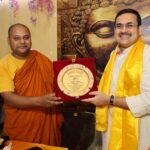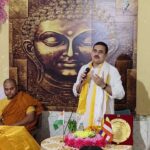Not Amit Shah but some Congressmen certainly need lessons in Indian history: a response to Jaipal Reddy
- By : Anirban Ganguly
- Category : Articles
The last historian worth his salt that the Congress had was Pattabhi Sitaramayya – and Pattabhi would lament that none in the Congress had any interest for the meticulous and selfless work of documentation and record keeping that he did. Later the Congress gradually outsourced history writing to Marist historians whose only academic aim was to deconstruct India, tarnish nationalist leaders – except those from the Nehruvian stable – Patel included and either justify or whitewash the collaborationist past of their comrades – especially during 1942.
Indira Gandhi’s recruit Nurul Hassan was hired to complete the outsourcing job. Naturally after this outsourcing the Congress has lost all historical perspectives and has to now again outsource the work of defending their patriarch and belittling the contributions of other nationalist stalwarts to a former socialist turned Congressmen.
It is amusing to see Jaipal Reddy a committed ex-socialist turned committed Congressman, with no known writings on history, come up and speak of Syama Prasad Mookerjee about whom he would have little or no knowledge. Instead of asking BJP chief Amit Shah to read history, Reddy would do well to himself read history of that period and to brush aside the cobwebs in his own reading of India’s post-independence history.
On referring Kashmir to the UN – Reddy must know that Nehru had unilaterally decided the matter – has he was handling Kashmir affairs and did not let Sardar look in it and would brook no interference from any quarter. Even Sardar felt it was a wrong decision. Reddy may read N.G.Ranga’s [leader from his own state] memoirs and articles on Sardar and will know what Sardar felt on Kashmir. A similar feeling was Dr. Mookerjee’s and others, but could the mighty Nehru be over-ruled? Jaipal Reddy’s knowledge of this period of India’s history is poor, at best rudimentary. It is common knowledge that the decision to refer Kashmir to the UN was not discussed in the cabinet and was taken unilaterally by Nehru without consulting his cabinet colleagues.
Reddy must also read Dr. Mookerjee’s intervention during the “Motion regarding Kashmir State” in the Lok Sabha on 7th August 1952 and will find Dr. Mookerjee himself answering all the points that Reddy raises. In fact, the perfect parliamentarian that he was and conscious of his binding to the oath of secrecy in his previous role has a Union Minister, Dr. Mookerjee during this discussion does not reveal to Parliament that the decision was solely Prime Minister Nehru’s and not a collective one. Unlike Congressmen of his era and of the present, Dr. Mookerjee had grace and rectitude in his public and parliamentary dealings. Unfortunately having come to the Congress, like all Congressmen, Reddy seems to have lost the habit of reading, reflecting and of research.
On August 7th 1952 Dr. Mookerjee pleaded for withdrawing the issue from the UN – “somehow we should withdraw ourselves from the UNO. We can tell them respectfully that we have had enough of the UNO and let us now consider and try to settle the matter through our own efforts…” And then he asked the Prime Minister on the floor of the House, “I would like to know from the Prime Minster” Is there any possibility of our getting back this territory? We shall not get it through the effort of the United Nations; we shall not get it through peaceful methods by negotiations with Pakistan. That means we lost it, unless we use force and the Prime Minister is unwilling to do so. Let us face facts – are we prepared to lose it?’ Dr. Mookerjee prescience on the Kashmir matter is evident here.
Dr. Mookerjee’s line on Kashmir was that of Patel’s but Nehru was never ready to admit that he had bungled and bring about a course correction. It is a well accepted reality today that rushing the Kashmir issue to the UN bogged us down into the marshes of international politics from which we have still not managed to extricate ourselves.
On Article 370 – I suggest Reddy read the Nehru-Mookerjee-Abdullah correspondences available in print in NMML archives, to better educate himself on the issue. Reams of papers and volumes have already been written on this. He can spend his period of political hibernation in reading these up.
Reddy’s other howler is that Dr. Mookerjee resigned from the cabinet because of Sheikh Abdullah – and that is where I say that Reddy, instead of trying to dabble in Jana Sangh history must rather focus on the history of the socialist movement in India – that is, as they say, pure fiction. It would just require a near average knowledge of history to know that Dr. Mookerjee resigned, along with K.C.Neogy in protest against the Nehru-Liaquat pact. Reddy would do well to read Dr. Mookerjee’s statement in the House on Wednesday, 19th April 1950. Dr. Mookerjee strongly felt that the Nehru-Liaquat would be incapable of providing security to the minorities in East Pakistan.
Amit Shah may be new to national politics, but he knows well the propensity of a section of the Lyutens elite of which Reddy was, till the other day, an exalted member, of indulging in false propaganda and baking history out of fiction. Our advice to Reddy is that:
- He should rather write a memoir on why the socialist movement in India failed and on why leaders like him had to desert the ship, dump it and jump onto the Congress band wagon in order to perpetuate a career in politics. He should, at least now, stop acting as a spokesperson of party whose stand and objectives he has actually always opposed.
- That Reddy himself draw up a syllabus of the history of the Congress party and initiate classes, right from its president and vice-president downward so that Congress members really know how far they have deviated from their core ideology and ideals if any.
Unless he does all of these in right earnest Reddy will be identified with those Congressmen who, as he once described them, are always “deficit in commonsense and with an information overload.”

















